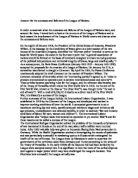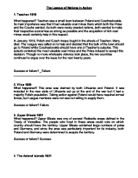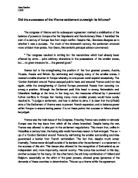The Successes and Failures of the Treaty of Versailles in Addressing the Causes of Conflict and Restoring Peace and Normality
To evaluate the successes and failures of the Treaty of Versailles, we need to address the terms of the Treaty as well as to inspect the consequences. The First World War had exposed Germany as a strong and aggressive power, and was viewed as a threat to peace by the victorious powers, so the terms of the Treaty of Versailles, which was designed to address the causes of conflict as well as restoring peace and normality, although including other peace measures, focused on harnessing and restricting Germany’s power so that they would never again be strong enough to become a threat. The disarmament of Germany proved to be short term as well as provocative, like the stripping of the colonies and the war reparations forced upon her. Germany was forced to admit to war guilt, which angered her and guaranteed a backlash which would eventually take the form of World War II. The aforementioned terms of the Treaty also created an extreme social, political and economic atmosphere in which another war was possible. The League of Nations was also formed and it enjoyed limited success, but, like all the other terms of the Treaty, it ultimately failed in addressing the causes of conflict and restoring peace and normality because in the end, there was another world war.
The League of Nations, which was written into the Treaty of Versailles, had an aim of addressing the causes of conflict and restoring and maintaining peace and normality by an unprecedented level of international co-operation although had some initial success, was ultimately a failure. During the 1920s, the League of Nations had several successes in preventing conflict, settling the Yugoslavia-Albania dispute, resulting in the withdrawal of Yugoslavian troops from Albania. It also created a feeling of increased international understanding and therefore security, allowing 15 major powers to sign the Kellog-Briand Pact, which stated that the participating nations would reject ‘war as an instrument of national policy’. On the other hand, the League was not successful in stopping conflict altogether. For example, despite the League’s efforts, they could not stop Poland from annexing Vilna or Italy from occupying Corfu in 1923. And it was difficult for the permanent members of the League to put aside their self interest to act as a whole to preserve peace and normality. The problem was that there was no enforcing power, and the members did not always agree. Evidence of this was the complete failure to adhere to the Geneva Protocol, which was designed to unite all league members as a collective military power in case of unprovoked aggression. Although France showed strong support for this, Britain vetoed it arguing that this would involve Britain in all conflicts, big and small. This created a problem in enforcing the peace settlement. Additionally, the League failed to establish a World Disarmament scheme, rejected because of national self interest from its members. Eventually Germany left the League of Nations because she did not receive equal treatment (the other powers could not risk Germany rising to power again), so because of the selfishness of individual nations, the League fell apart. To sum it up, although the League of Nations had some limited success in resolving minor disputes, it could not completely restore peace and normality, and it was weak from the self interests of the major powers (permanent members) of the League.







